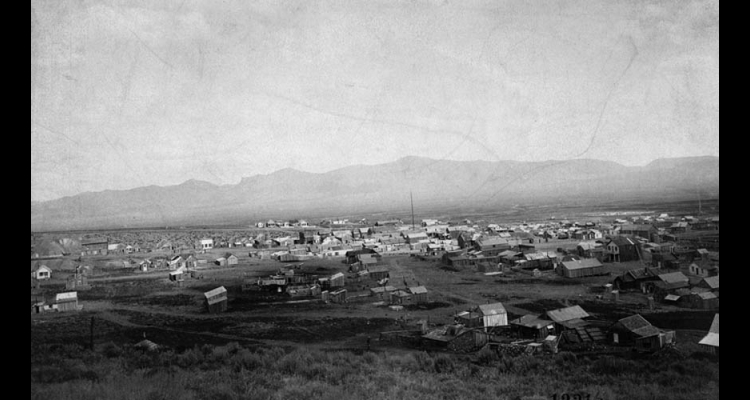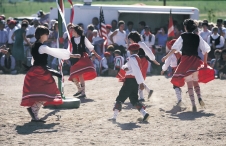Western Folklife Center
In 1980, the Utah Folklife Center, under the direction of Utah State Folk Arts Coordinator Hal Cannon, expanded its focus beyond the Beehive State's borders and became the Western Folklife Center in Elko, Nevada. Cannon remains the Founding Director. The Western Folklife Center's mission is to study, preserve, and perpetuate the rural culture of the West.
At its headquarters in the historic Pioneer Hotel building in downtown Elko, the Western Folklife Center achieves its mission by demonstrating and preserving traditional activities such as saddle making and storytelling with exhibits and workshops. The art, music and dance of Basques, Indians, and Mexican-Americans are featured, along with photography and artifacts. A gift store sells books, CDs, crafts by regional artisans, and other Western memorabilia. The intimate G Three Bar Theater, with an antique wooden bar at its entrance, hosts musical acts ranging from folk to country to jazz.
From its media office in Salt Lake City, the Western Folklife Center produces radio shows about Western life for National Public Radio. The Center's fledgling record label, Deep West Records, produces limited-edition CDs of stories and songs, each focusing on a particular location, such as the Grand Canyon. The Western Folklife Center's website includes weblogs, public discussion forums, and online journals posted by Western photographers, artisans, and writers, facilitating the collection and dissemination of information unique to Western rural culture.
The Western Folklife Center emphasizes traditional and contemporary ranching culture, which is showcased at the center's largest annual event, the National Cowboy Poetry Gathering. This week-long poetry and music festival was originally conceived by the Institute of the American West as a one-time event; continuing the Gathering on an annual basis is now part of the Western Folklife Center's mission.
The term "cowboy poetry" may sound like an arbitrary or even absurd mixing of elements, but traditions of pastoral poetry, using cattle herding as a celebratory metaphor, appeared in Greek and Buddhist literature thousands of years ago. An Americanized version of the cowboy poetry tradition was established during the post-Civil War decades of rapid Western expansion. Groups of frontier laborers—a heterogeneous mix of displaced veterans, immigrants, black cowboys, and recently unemployed sailors forging into the largely unknown, but already deeply mythologized Western frontier—were natural incubators for storytelling.
A century later, stories, poems, and music about ranching life were still circulating and being enthusiastically produced. As the Western Folklife Center defined its mission, Cannon and his staff surveyed ranchers, cowboys, and poets to determine a location for a gathering. They chose Elko, centrally located, easily accessible by Interstate 80, affordable, and with hotels built to accommodate casino visitors, able to accommodate a festival that attracts an estimated 8,000 visitors annually.
The National Cowboy Poetry Gathering is held each January, when ranchers' workloads are lightest. Poets, musicians, and spectators come from local ranches and as far away as Australia, where "bush poetry" culture bears similarities to the American cowboy poetry scene. Often, the gathering features a headlining musical act from a foreign country's rural reaches. Recent visitors have included Mongolian throat singers and South American cowboy musicians, reflecting the diversity of environments and influences that have ranching culture in common.



